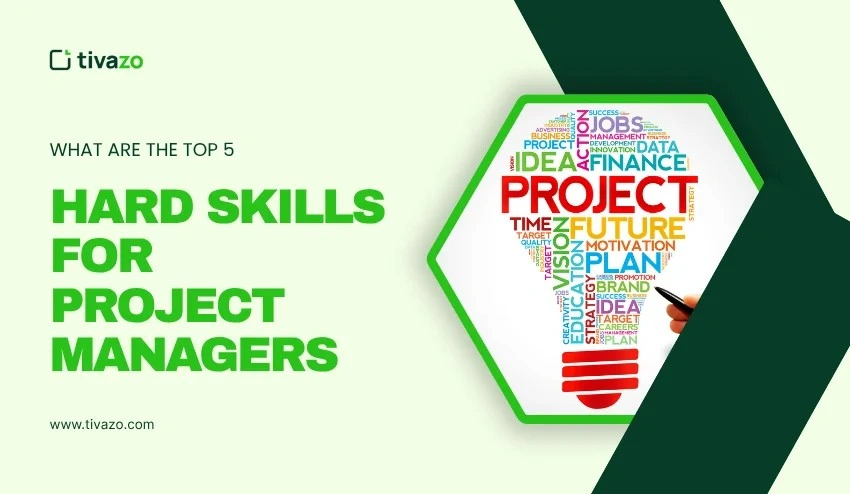In the competitive arena of today, project managers are required to possess a range of technical skills. These technical skills, also known as hard skills as opposed to soft skills, are crucial for successful project management and the ultimate delivery of a project satisfactorily, both on time, with regard to cost, and to the desired quality.
To aid you in your career development and to enhance your abilities to manage projects, I will guide you to through the below five hard skills expected of project managers in 2026.
Key Highlights:
- What Are Hard Skills for Project Managers?
- Types of Hard Skills
- Hard Skills Every Project Manager Should Master
- Why These Hard Skills Are Critical for Project Managers
- Hard Skills vs. Soft Skills
- Acquire and Improve These Hard Skills for Project Management
- Resources to Learn Hard Skills
- Showcase Your Hard Skills for Resume
- Common Mistakes Project Managers Make with Hard Skills
- Examples of Hard Skills
What Are Hard Skills for Project Managers?
Hard skills, also referred to as technical skills, are specifically defined, manpower, or other knowledge base, and they are teachable. These skills can be measured and quantified. With reference to the project management profession, hard skills are technical skills that a project manager requires to effectively plan, implement, and monitor a project. Hard skills are learned as a result of education, certifications, and experience.
For a project manager, being trained and demonstrating mastery of the right hard skills is often the distinction between a normal project that has been successful versus one that has failed. The top hard skills that project managers must have competency in include project planning, risk management, and financial management.
Types of Hard Skills
Hard skills entail the specific, instructable abilities, which can be acquired either through learning or experience. Some of the typical types of hard skills include the following:
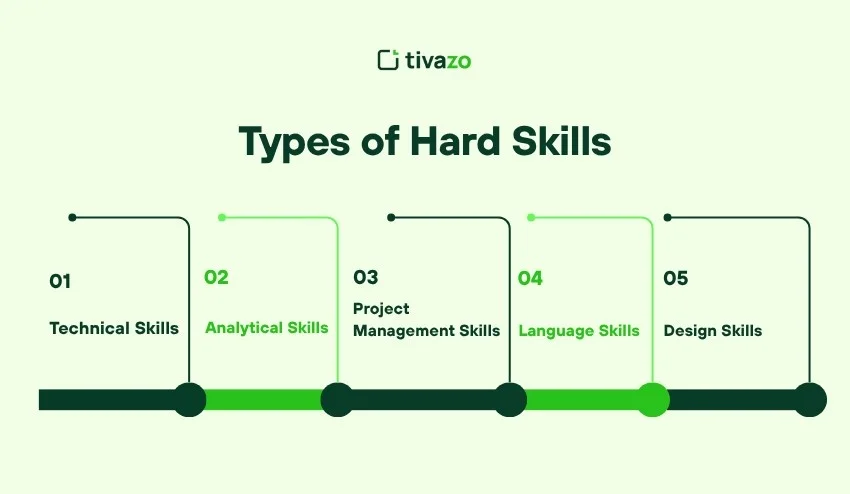
1. Technical Skills
These are the skills involving certain technology, tools or software. Example: web design languages, such as HTML, CSS, and JavaScript.
2. Analytical Skills
Capacity to collect information and make sound judgments about the information. Example: trend analysis, financial forecasting, and data analysis.
3. Project Management Skills
The abilities required to facilitate/manage project schedules, project deliverables, and resources. Examples: with the help of Agile and Scrum, or with project management software, such as Jira and Trello.
4. Language Skills
The physical capability to communicate in a different or different languages in multiple environments. Example: native Spanish, Mandarin, and French.
5. Design Skills
The skill to develop visual ideas or designs for a project. Examples: UX/UI design and perhaps Adobe Illustrator: graphic design.
The Top 5 Hard Skills Every Project Manager Should Master in 2026
Project managers should acquire a core of hard skills to be able to survive and be relevant in 2026. Such skills will not only enhance productivity but also help gain the confidence of the stakeholders and clients. Here are the top 5:
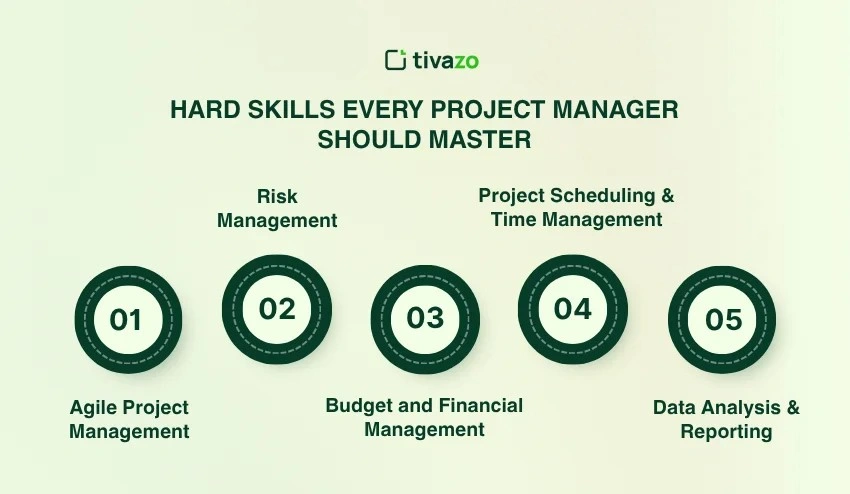
1. Agile Project Management
The Agile methodology has become commonplace in the project management industry. It comes in handy, especially when dealing with a project that has dynamic requirements and a strict deadline. The ability to address projects by applying the principles of Agile has become one of the important hard skills that every project manager must possess.
- Employs feedback and development cycles.
- Supports malleability and flexibility.
- Is concerned with teamwork and self-organizing teams..
2. Risk Management
Risks are inherent to every project, and the project managers should be prepared to spot, evaluate and avert these risks successfully. Risk management expertise will guarantee the optimization of project timelines, budgets, and resources, and reduce the adverse effects.
- Determines possible risks at the early stage of the project.
- Works out the contingencies in case of unexpected problems.
- The monitors take periodic risks within the project.
- Ensures the appropriate risk communication to the stakeholders.
3. Budget and Financial Management
Knowledge on budgeting and how to allocate funds is a precious hard skill to project managers. One of the largest problems is project costs, and being able to master financial management can lead to a considerable difference.
- Prepares and oversees project budgets.
- Distributes resources effectively with the aim of reducing costs.
- Measures costs against the budget to prevent growth.
- Discloses financial reports to the stakeholders.
4. Project Scheduling & Time Management
Time management is a critical skill as a project manager since it makes tasks to be accomplished on schedule. Being able to use project scheduling tools such as Gantt charts, Microsoft project, or other project management software will facilitate the workflow and enable all members of the team to be on track.
- Establishes achievable project schedules and tasks.
- Delegates responsibilities and coordinates dependencies.
- Monitors progress and makes changes in schedules when required.
5. Data Analysis & Reporting
The ability to process data and produce reports, which are informative and implementable, is emerging as one of the most demanded hard skills in project management in the era of data. Using the performance data, a project manager can have insights regarding the progress of the project and make changes to the strategies so as to achieve the best performance.
- Examines project levels to determine project success and project progress.
- Determines data trends and bottlenecks.
- Produces simple, practical reports to the stakeholders.
- Makes sound decisions and maximizes strategies using data.
Why These Hard Skills Are Critical for Project Managers in 2026
Robust project managers have to adjust to such changes as remote work, cloud apps, or AI as we reach 2026. Learning of the necessary hard skills, i.e., Agile, risk management, and financial oversight, will enable them to remain competitive and easily negotiate the changing environment of the projects. These capabilities are important to effective project implementation in the ever-more complex environment.
- Agile Project Management: Mastering Agile enables project managers to change quickly and complete projects based on stringent deadlines successfully.
- Risk Management: Risk identification and management guarantees that projects remain on schedule, reducing interference and maximizing the use of resources.
- Budget and Financial Management: Good financial competencies promote cost control and management of budgets by project managers and adherence to financial limitations in the project.
- Project Scheduling and Time Management: Effective scheduling will ensure that the projects proceed on schedule and that the tasks are accomplished in time and meet deadlines.
Hard Skills vs. Soft Skills: What’s the Difference?
It is important that a project manager who is considering advancing their career understands the difference between hard skills and soft skills. The 2 forms of skills are essential in success yet they are used in varying ways. The two have been compared below to enable you to have an idea on how each of them contributes to project management:
| Hard Skills | Soft Skills |
|---|---|
| Definition: Measurable, technical skills like programming or data analysis. | Definition: Interpersonal skills like communication and teamwork. |
| Measurable: Easy to quantify and assess through tests or certifications. | Measurable: More difficult to quantify, assessed through behavior and performance. |
| Examples: Project management software, coding, data analysis. | Examples: Leadership, time management, emotional intelligence. |
| Training: Acquired through formal education, certifications, or hands-on experience. | Training: Developed through practice, mentoring, and real-world situations. |
How to Acquire and Improve These Hard Skills for Project Management
Hard skills require constant acquisition and refinement to become the best project manager. It not only demands intellectual understanding it also involves acquiring practical experience, keeping abreast of what is happening in the industry, and being proactively involved in polishing these major competencies. The following are just a few things you can do to develop and sharpen your hard skills in project management:
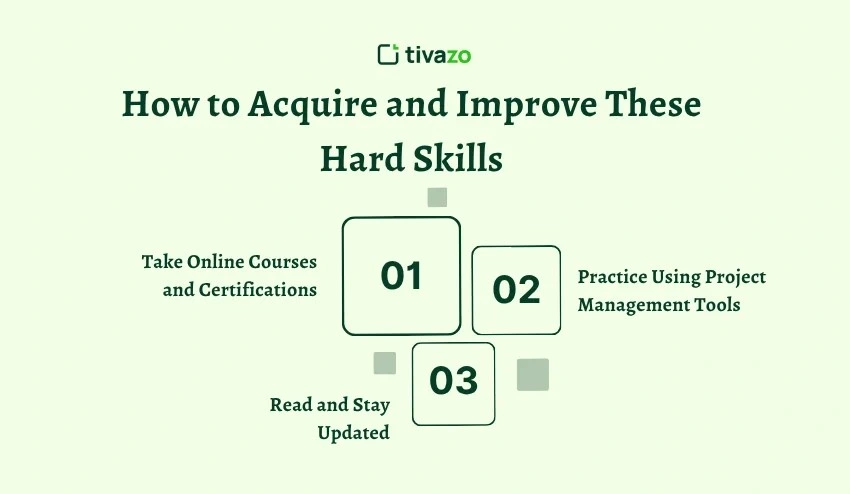
1. Take Online Courses and Certifications
In order to be ahead in 2026, one should also keep in mind earning such certifications as PMP (Project Management Professional) or Agile Certification. These certifications provide guided education and may be a major impediment to your career development.
2. Practice Using Project Management Tools
It is possible to develop skills such as project scheduling and data analysis only through hands-on experience with project management tools. Get accustomed to software such as Asana, Trello, and Jira and understand how to use them in order to deliver a project.
3. Read and Stay Updated
Trends in project management change rapidly; therefore, it is necessary to keep up with them in blogs, books, and webinars in the industry. You can also keep your skills up to date by subscribing to websites such as the Project Management Institute (PMI) or PMI digital badges.
Best Resources to Learn Hard Skills for Project Managers
To keep expanding and remain ahead in terms of the project management process, it is important to have access to the reliable and extensive sources that offer structured learning, certification programs, and practice. These materials are aimed at helping you to master the hard skills that are all the more becoming increasingly significant as we approach 2026. The following are some of the most effective platforms and tools that would enable project managers to gain and practice the essential hard skills:
- Coursera: Provided certification programs in Agile Project Management, PMP, etc.
- PMI: Professional development and certification.
- LinkedIn Learning: Offers online courses in budgeting, time management, and risk management.
With such resources, you will be capable of refining the hard skills that will be crucial in 2026 and later.
How to Showcase Your Hard Skills for Resume
Project managers must be tactic in presenting their hard skills on their resumes. It is worth pointing out your Agile certification, experience in project management tools, and budgetary management in your resume to make them stand out. Always make sure that you prepare your resume according to the job description, highlighting the hard skills that are most applicable to the job.
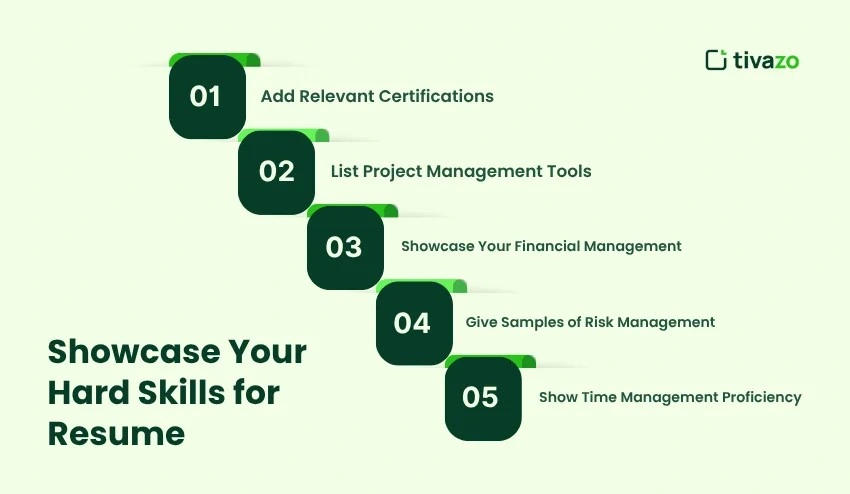
- Add Relevant Certifications: Certifications like the PMP, Scrum Master, or Agile certifications also reflect someone who is dedicated to continuous improvement, and these certifications are highly desirable to employers. Ensure that these are mentioned in the list of things that are distinctly specific to your qualifications or certifications.
- List Project Management Tools: Describe your experience with popular project management software, such as Asana, Jira, Trello, and Microsoft Project. Employers would desire to understand that you can operate the tools that are required to handle work and scheduling, as well as coordination within your team.
- Showcase Your Financial Management: In case you have worked with budgets or with financial forecasting needs, it is important to highlight them. Provide particular examples such as “Managed project budget of 1M funded, improved resource allocation, reduced costs by 15 per cent.
- Give Samples of Risk Management: In case you have assessed and addressed risks on prior projects, then you should include them. As an example, a reduction in the number of project delays by 20% can be achieved by implementing a risk assessment protocol.
- Show Time Management Proficiency: Describe particular tools and methods of time management that you have utilized, Gantt charts or the critical path method (CPM), and how you have successfully managed to keep things on schedule.
Common Mistakes Project Managers Make with Hard Skills
Hard skills can be mistakes by even experienced project managers. The following are some of the frequent mistakes to be avoided:
- Underestimation of the role of communication skills: In as far as hard skills are imperative, they should be accompanied by good soft skills.
- Lack of skill upgrading: says, project management tools and techniques are dynamic, and therefore, it becomes necessary to remain abreast of the industry and best practices.
- Failing to Routinely Evaluate Risks: Projects can be derailed by forgetting to assess their possible risks regularly. Risk management is critical in ensuring the progress of projects.
- Ignoring Data and Analytics: It is possible to fail to evaluate performance by executing something without using data to facilitate project success. Data analysis assists in streamlining strategies and make decisions.
Examples of Hard Skills in the Workplace
Hard skills are unique, teachable skills generally quantifiable. These are some of the major examples of hard skills in different industries:
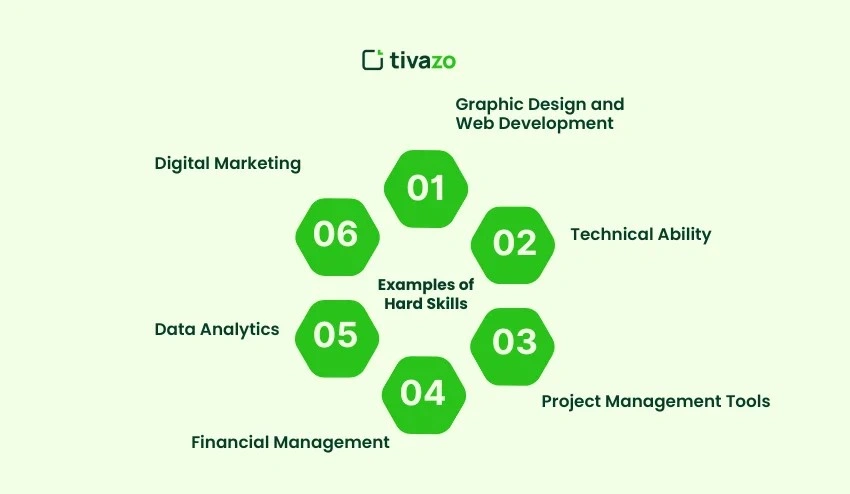
- Graphic Design and Web Development: Tell-tale skills in the creation of visual content or the creation of websites in terms of their production with the help of tools, such as Photoshop or HTML/CSS.
- Technical Ability: The ability to code, analyze data, and the ability to use software, such as Microsoft Excel or Adobe Creative Suite, or Python programming.
- Project Management Tools: The tools to are popular in this category are Trello, Asana, and Jira, which are used to plan and monitor the development of the project.
- Financial Management: The capacity to utilize budgets, financial projections, and the allocation of resources among projects.
- Data Analytics: This skill can be defined as the capacity to extract meaning and understand vast volumes of data to convert raw quantities into actions.
- Digital Marketing: Skills in digital marketing, like SEO, content marketing, and social media management), to promote products or services online.
Conclusion
Hard skills are imperative for every project manager who is aspiring to be an excellent project manager in 2026. These skills will not only make your projects run more efficiently, but also make you grow as a professional, whether it is the Agile method or budget management. Beginning to build these skills will make you the project manager that everyone in the team will enjoy today.
